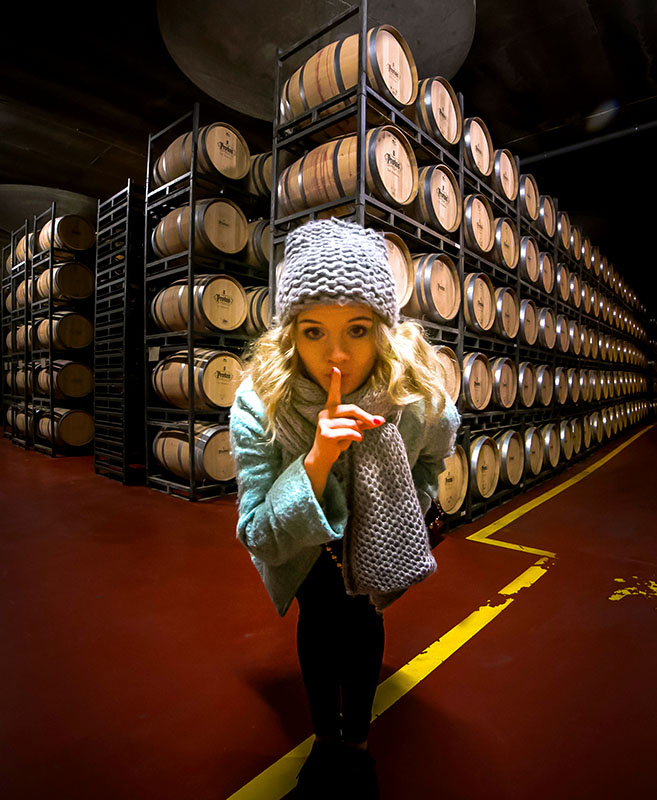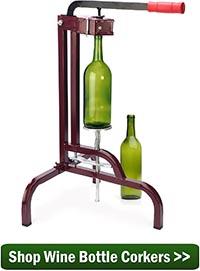 I hope this finds you well and prospering. Is aging homemade wine in a refrigerator OK, say for several months? Also, what temperatures would be best for storing the wines long term? Would long, cool storage affect the aging of the wine? Thanks, and keep up the good work, we sure appreciate your help in many areas.
I hope this finds you well and prospering. Is aging homemade wine in a refrigerator OK, say for several months? Also, what temperatures would be best for storing the wines long term? Would long, cool storage affect the aging of the wine? Thanks, and keep up the good work, we sure appreciate your help in many areas.
Name: N. Gerchak
State: Oregon
—–
Hello Mr. Gerchak,
Thanks for the kind words. We try very hard to answer your questions to the best of our ability.
It is perfectly fine, and preferable, that you age your wines for a few months. The need for aging your homemade wine is a given. I have found that with white wines 6 months will get the majority of the aging done. The typical white you find on the store shelf has been aged for about 18 months. Red wines could be aged anywhere from 2 to 5 years before they are sold.
Of coarse, the type of wine grape we are talking about enters into this equation, as well. For example, a Gamay will need much less aging than a Cabernet even though both are red grapes. This is because the make-up of each of these grapes are very different. Most notably, their tannin structure are on opposite ends of the scale – Gamay being low tannin, Cabernet being high tannin. This plays into how much aging is required for a wine to fully maturate and exude the maximum pleasantries that it can.
Just as the type of grape can affect the aging life of a wine, so can temperature, and this leads us back to answering your question about aging homemade wine in a refrigerator. Very simply: the cooler the storage temperature, the slower the wine will age. Although this is the general relationship between temperature and aging wines, there is still a optimal temperature range at which you would like to store your wines. This would be somewhere between 45°F. and 65°F. If you can’t store your homemade wine in this temperature range, then you want to get as close as you can.
 Slow, cold aging can be either a good thing or a bad thing depending on your perspective. As home winemakers we tend to want our wines to age quickly. We want the time between bottling and consumption to be very short. We want them to be at their best in a matter of weeks, not months or years, for no other reason than we are impatient. On the other hand, aging the wine too quickly could leave you with a rack of wine that has all passed its prime. Wines do not continue to improve indefinitely with more aging.
Slow, cold aging can be either a good thing or a bad thing depending on your perspective. As home winemakers we tend to want our wines to age quickly. We want the time between bottling and consumption to be very short. We want them to be at their best in a matter of weeks, not months or years, for no other reason than we are impatient. On the other hand, aging the wine too quickly could leave you with a rack of wine that has all passed its prime. Wines do not continue to improve indefinitely with more aging.
With that being said, the temperature at which you age your homemade wine should be taken into consideration. partially based on your consumption habits. Your adjustment could be something as simple as storing the wine upstairs instead of downstairs, in the cooler basement or vise versa. Or as you have mentioned, moving the wine from the basement into a refrigerator.
As you may have gathered by now, aging homemade wine in a refrigerator is okay to do, just expect it to take longer to fully mature. If you do not have a problem with this, no worries, however if you are wanting you wines to age as quickly as possible, this may not be the route you want to go.
There are a couple of suggestions I could make that would help improve upon your desire to refrigerate your wine. One is to age the wine at more-convenient, warmer temperatures for a few month – say, 3 to 6 months. Then store the wine in the refrigerator at its maximum setting (usually around 45°F). This will suspend the life of the wine for many years.
You could also go a whole different route. You could purchase a external, power interrupt temperature controller thermostat. This would allow you to set the refrigerator at any cooler temperature you would like, even 55°F. You do this by setting the refrigerator to its coldest setting. Then use the temperature controller to run the refrigerator as needed. It acts as an external thermostat that turns the power to the refrigerator on and off as need to maintain the temperature you select.
Happy Winemaking,
Ed Kraus
—–
Ed Kraus is a 3rd generation home brewer/winemaker and has been an owner of E. C. Kraus since 1999. He has been helping individuals make better wine and beer for over 25 years.

When you use the term white wine? Are you referring to wine must, that is fermented with out the grape skins during fermentation, such as making it from store bought juices and concentrates? I thought white wine means wines made without the skins?
James, in the context of the above, white wine is referring to any wine that is lighter in body. Lighter boded wines need less aging. This would typically be wines that were not fermented on the skins, but it does not mean all store bought juices and concentrates. Many of these juices are stored with the pulp before being concentrated, so in fact, you can have a full bodied wine from a juice or concentrate.
What about the usual homemade fruit wines? How do you gauge aging and storing?
D. Finley, the storage temperature would be the same for fruit wines as well. As far as the aging time, a good rule of thumb for fruit wines is about 6 months.
can oak wood barrel be stored directly in refrigerator,,,,pls guide me,,,
Lalit, it would be fine to store your oak barrel in the refrigerator. However, we would recommend cleaning the inside of the refrigerator with bleach before doing so. This will help prevent contamination of the outside of the barrel with mold or bacteria.
I made two 5 gal. Batches of Muscadine wine that was a beautiful red. When I bottled it and put the camp den tablets in it turned almost brown. What did I do wrong?
Charles, You did not do anything wrong. We have heard of this happening on occasion. However, the change is not permanent, the color should return within a few hours.
Hi there , I have been making wine for a few years now with some satisfactory results .
In 2018 at first racking I noticed a smell of rotten eggs and I racked using a trash pump instead of the traditional one I use ,aerating and splashing it over a sheet of copper. After second racking and sulfating for the second time i bottled as I usually do. This resulted in the best tasting wine I ever made using the same grapes , the only thing I did different was the splashing on copper . Do you thing that there was any relation ?
Thanks in advance .
All the best.
There could be some correlation between the two. Running over copper could be giving the wine a cleaner flavor that before. If you wine always has some rotten egg smell, just on an unnoticeable level, this treatment may always give you better results.
Hi,
Thanks for your articles. I made a blush from my zin this year and I also made a Riesling that we create a champagne with. I have both in a fridge right now. I’m in SoCal, always hot when harvesting, so during primary fermentation we always have to cool our fermentations down. During aging the ambient conditions are much cooler. Should they be aged refrigerated?
Thank you,
Californiabubbles
I’m not convinced that you “need” to age you wine under refrigeration, other than to say, it is always better to age at 60F than 70F, but is it enough difference to make it worth the effort?
Ed,
Is there a temperature to aging scale that you have found effective?
Example: Aging Cab at 70 degrees Fahrenheit for 12 months is approximately the equivalent to 24 months at 65 degrees Fahrenheit.
This might be a very over simplification of temps and aging.
Scott
Scott, Most wine experts agree that the ultimate storage temperature for most bottled wines is 55 degrees F. For more information on aging temperatures, please see the article link below.
Wine Bottle Storage And Temperature
https://eckraus.com/wine-making-bottle-storage/